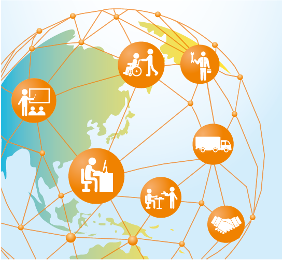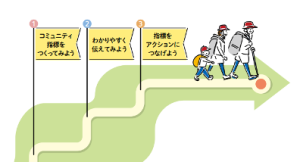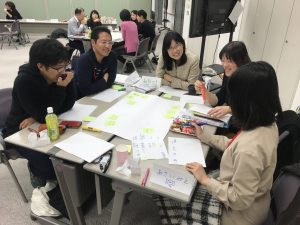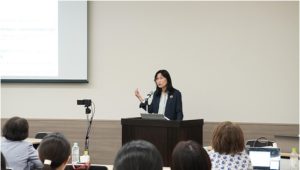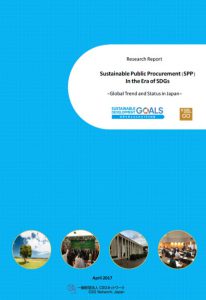 The theme of this report is Sustainable Public Procurement (SPP). Many of you may find the term unfamiliar, but it is our hope that this report will familiarize the readers with SPP as something that must be integral to the citizens’ expectations for government agencies and the public sector in
The theme of this report is Sustainable Public Procurement (SPP). Many of you may find the term unfamiliar, but it is our hope that this report will familiarize the readers with SPP as something that must be integral to the citizens’ expectations for government agencies and the public sector in
achieving a sustainable society. When it comes to public procurement, it is no longer sufficient to
simply avoid unfair practices, bid riggin (collusion), or other violations of applicable laws. In fact, public procurement is expected to be a strategic policy instrument towards achieving a sustainable society.
This report reviews and examines SPP from the following perspectives:
▪ What is SPP? Why is it necessary?
▪ How has SPP been promoted in the procurement processes within the international community?
▪ How much has SPP been implemented in Erope and the United States?
▪ What is the current state of SPP in Japan?
▪ What issues must be considered and what challenges must be overcome in order to
mainstream SPP in Japan?
Contents
INTRODUCTION: Sustainable Public Procurement (SPP) in the Era of SDGs
Katsuji Imata, Board Chair, CSO Network Japan
1. What is Sustainable Public Procurement?
1.1 Defining Sustainable Procurement
1.2 Benefits of Sustainable Procurement
1.3 Challenges of Sustainable Procurement
[COLUMN] “World Trends: Global Lead Cities Network on Sustainable Procurement”
Masumi Yoshikawa (Program Officer, ICLEI Japan)
2. Implementing and Managing Sustainable Public Procurement
2.1 Sustainable Public Procurement Management Methods
2.2 Sustainable Procurement Process and Key Sectors
2.3 Sustainable Public Procurement Monitoring Systems
3. Case Studies from Europe and the United States
3.1 Case Studies from European Local Governments
[COMMENTARY] “EU Public Procurement Directives and the LCC”
Hidemi Tomita (Director and General Manager of Business Development Division, Lloyd’s Register Japan)
3.2 Case Studies of Socially Responsible Public Procurement: From the Human Rights Perspective
[COMMENTARY] “Modern Slavery Act in the United Kingdom”
Takeshi Shimotaya (Managing Director, SustainaVision)
3.3 Case Studies from the Unite States
[COLUMN] “Child Labor Prevention Measures and Public Procurement”
Yuka Iwatsuki [President, Action against Child Exploitation (ACE)]
4. Trends in Japan
4.1 Act on Promoting Green Purchasing (Ministry of the Environment)
[COLUMN] “Green Purchasing: Challenges and Lessons for SPP”
Hideki Nakahara (Senior Fellow, Institute for Global Environmental Strategies (IGES); Professor Emeritus, Tokyo City University; Chair, International Green Purchasing Network)
4.2 Promotion of CSR among Local Governments and Public Procurement: The Case of Yokohama City
[COLUMN] “Local Government’s Human Rights Considerations in Public Procurement”
Hidenori Matsuoka [Specially Appointed Researcher, Asia-Pacific Human Rights Information Center (HURIGHTS OSAKA)]
4.3 Trends among Other Local Governments: Public Contract Ordinances
[COMMENTARY] “Sustainable Public Procurement and the 2020 Tokyo Olympic and Paralympic Games”
Kaori Kuroda (Executive Director and Board Director, CSO Network Japan)
5. Looking Towards the Future
5.1 Japanese Government Measures and Challenges
5.2 Reporting from the “1st Sustainable Public Procurement Forum: Possibilities of Local Governments’ Sustainable Public Procurement Measures in the Era of SDGs”
[COLUMN] “Yuki-no-Sato Touwa Regional Resource Circulation Center and the New Public”
Seiji Sugeno [Yuki-no-Sato Touwa Furusato-zukuri Kyogikai (Council for Hometown Development of Organic Farm Village Touwa)]
5.3 Towards the Future: What Can Be Done to Promote SPP?





